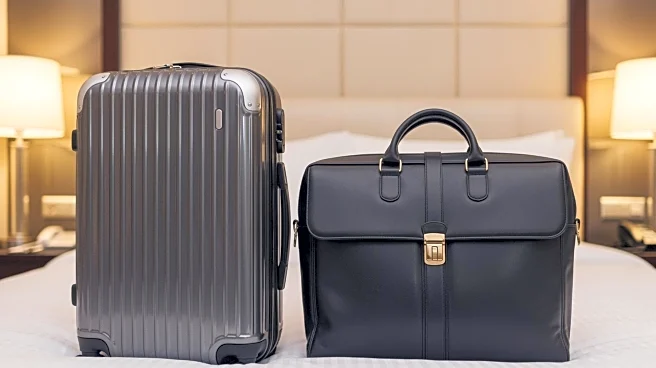What's Happening?
A survey conducted by Uber and the Global Business Travel Association (GBTA) indicates a growing interest in bleisure travel among corporate travel managers in the US and Canada. The survey reveals that 90% of managers report employees are as interested,
if not more, in bleisure travel compared to pre-pandemic times. This trend is reflected in the behavior of business travelers, with 81% already incorporating leisure activities into their work trips. In 2022, bleisure travel accounted for over a third of all trips, with travelers extending their stays by an average of 4.5 days to enjoy their destinations.
Why It's Important?
The increasing popularity of bleisure travel has significant implications for the travel industry and corporate policies. As employees seek to balance work and leisure, companies may need to adapt their travel policies to accommodate this trend, potentially leading to increased employee satisfaction and productivity. The trend also presents opportunities for travel companies to develop new products and services that cater to bleisure travelers, such as flexible travel packages and loyalty programs. Additionally, the rise in bleisure travel may drive growth in the hospitality sector, as hotels and other accommodations strive to provide amenities that appeal to both business and leisure travelers.
What's Next?
As bleisure travel continues to gain traction, companies may focus on enhancing their travel policies to support this trend. This could involve offering incentives for employees to extend their work trips for leisure purposes, such as discounted rates or loyalty rewards. Travel companies might also explore partnerships with technology providers to offer solutions that enhance the bleisure travel experience, such as apps that help plan and book leisure activities during business trips. Additionally, the emphasis on work-life balance may lead to changes in corporate culture, encouraging employees to take advantage of bleisure opportunities.
Beyond the Headlines
The bleisure travel trend reflects broader societal changes, including the increasing importance of work-life balance and the desire for more meaningful travel experiences. As remote work becomes more common, individuals are likely to continue seeking ways to integrate leisure into their professional lives, potentially leading to long-term shifts in travel patterns and consumer behavior. This could have implications for urban planning, hospitality, and transportation sectors, as companies adapt to meet evolving consumer expectations. Additionally, the focus on blended experiences may drive innovation in these industries, as businesses strive to provide unique and high-quality travel options.















